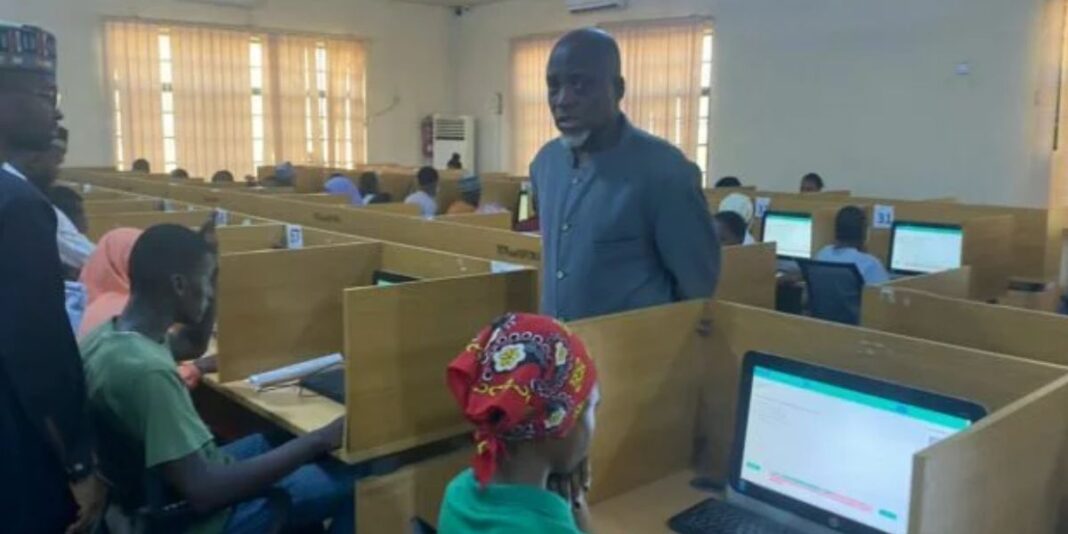Over 21,000 candidates failed to attend the rescheduled 2025 Unified Tertiary Matriculation Examination (UTME) conducted by the Joint Admissions and Matriculation Board (JAMB). The resit was organised for candidates affected by technical disruptions during the main UTME across selected centres.
In a statement released on Sunday by JAMB’s Public Communication Advisor, Dr. Fabian Benjamin, the Board disclosed that out of the 336,845 candidates slated for the resit, 21,082 were absent.
Despite the absences, JAMB noted that performance among those who sat the resit aligned with historical trends, referencing past success rates ranging from 11% in 2013 to 34% in 2016. The Board dismissed as baseless the claim that some candidates in the cancelled sessions had posted exceptionally high scores, clarifying that only a few scored as high as 217, while 99% scored below 200.


However, the release of results has been overshadowed by new revelations of widespread examination malpractice involving candidates, school proprietors, and CBT centres. JAMB stated that the resit process underwent rigorous scrutiny by its Chief External Examiners (CEEs), led by Prof. Olufemi Peters, Vice-Chancellor of the National Open University of Nigeria (NOUN), and psychometrics expert Prof. Boniface Nworgu.
Several key resolutions were made during a nationwide meeting of the CEEs. These include the conditional release of results for underage candidates, those implicated in online “WhatsApp runs,” and a limited number who missed the resit due to valid reasons.
JAMB clarified that underage candidates—many of whom had previously acknowledged in writing that they did not meet admission requirements—had their results released only for record-keeping, and they remain ineligible for admission.
Similarly, candidates found to have participated in academic misconduct via illicit platforms were granted a one-time waiver. The Board stressed that this decision should not be misconstrued as approval of wrongdoing and warned students to steer clear of fraudulent online networks.


For those who missed both the main UTME and the resit, JAMB has provided one final opportunity through its annual mop-up examination.
Meanwhile, multiple CBT centres have been blacklisted for serious infractions such as biometric manipulation and impersonation facilitation. JAMB confirmed that proprietors of these centres will face prosecution, and all individuals linked to the fraud are being traced.
According to JAMB, some centres colluded with school proprietors to hack CBT networks, gain remote control of candidate computers, and submit answers without candidates’ input—an act uncovered by security agencies.
The Board raised the alarm over increasingly sophisticated cheating tactics in the 2025 exam cycle, including:
- AI-enhanced photo manipulation for impersonation
- Hacking of CBT networks
- Use of concealed “strong rooms” to extend network access
- Recruitment of mercenary candidates to sit exams for others
“While some Nigerians are engrossed in conspiracy theories, our educational future is being undermined by advanced forms of digital fraud,” the Board warned.
Over 3,000 candidates have been identified as having engaged in such malpractices. Their results will be withdrawn pending the conclusion of investigations.

JAMB also dismissed ethnic and regional claims surrounding the cancellation of results in six states, reiterating that 99% of affected candidates had scores below 200 and that no region was unfairly targeted.
One notable case involved Olisa Gabriel Chukwuemeka, a first-year Public Health student at Adekunle Ajasin University, Akungba-Akoko (AAUA), who falsely claimed to have scored 326 in the 2025 UTME. Investigations revealed that he had manipulated his 2024 result (203) to impersonate a high-scoring 2025 result. His actual 2025 score was 180, and has been withdrawn. Following the exposure, Chukwuemeka reportedly deactivated his X (formerly Twitter) account.
Addressing concerns about result-checking costs, JAMB clarified that its SMS shortcode services (55019/66019) are subsidised to protect candidates’ personal data from cybercafés and third-party platforms. Candidates were advised not to recheck their results unless directly notified by JAMB of any changes or infractions.
The Board expressed gratitude to security agencies for their role in uncovering examination fraud. It also acknowledged the cooperation of other educational bodies, including WAEC, NECO, ABU, and the Teachers Registration Council of Nigeria, for adjusting their examination timetables to accommodate the resit.
JAMB commended the resilience of affected candidates and reaffirmed its commitment to a technology-driven, transparent, and credible examination process. Despite growing challenges, it maintained that the CBT model remains the most effective method for curbing malpractice and advancing Nigeria’s education system.
Dr. Fabian Benjamin concluded by urging all Nigerians to unite in defending the integrity of the education system against increasingly digitalised and coordinated forms of cheating.




